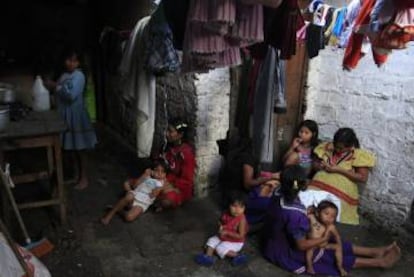Colombians believe reconciliation would bring poverty reduction
As peace process advances, survey reveals concerns about the future of the country

As talks between the Colombian government and leftist rebels aimed at ending five decades of conflict move steadily forward, Colombians are at last talking about the possible benefits that reconciliation will produce in the South American country.
A survey of almost 1,000 people carried out by the Corporación Reconciliación Colombia, a multi-sector organization, in 43 towns and cities throughout the country shows that 43% of respondents believe the main benefit of reconciliation will be less poverty and greater employment opportunities, a hope that reflects the fact that more than 60% of Colombians report they cannot make ends meet. Data for last year shows that 7.9% of the population lives in extreme poverty, a figure that rises to 18% in rural areas.
The survey also shows that 13% of Colombians believe that peace will also reduce crime. Some 33% say they associate reconciliation with tolerance, with 25% associating it with forgiveness, 19% with respect, and 10% with trust.
Colombia remains in conflict and it is important to protect those working to defend human rights
More than half of those surveyed believe that one of the main factors in bringing about reconciliation will be implementing social programs to help former rebels and paramilitaries, particularly in rural areas. Around 66% say that if they were in a position to offer a job to a former combatant, they would do so, while 73% said they would be happy to see their children attending school with the children of former combatants. Over the last 13 years, at least 59,000 former members of an armed group have joined civil society.
“We need to remember that at present, at least 30% of business owners are involved in reconciliation processes through job creation, but this needs to be consolidated, particularly in cities like Bogota, where there is so much inequality,” says Mónica de Grieff, director of the capital’s Chamber of Commerce.
She says the biggest challenge will be providing work for former combatants: “Almost 86% of businesses here are tiny, and 90% of those are family businesses. Many of them don’t pay social security contributions for their employees, which is going to make a genuine reconciliation very difficult.”
Even though 82% of those surveyed say they consider themselves to have embraced reconciliation, more than half believe that Colombia remains in conflict and that it is important to recognize political and other differences, as well as protecting those working to defend human rights.
Sign up for our newsletter
EL PAÍS English Edition has launched a weekly newsletter. Sign up today to receive a selection of our best stories in your inbox every Saturday morning. For full details about how to subscribe, click here
De Greiff warns that despite what many people say about the importance of reconciliation, the country is still divided: “There is a lack of tolerance. We still have a lot to do.”
Corruption remains a key concern for Colombians, with 79% saying graft needs to be rooted out. Antanas Mockus, the former mayor of Bogota, says it is logical that corruption is one of people’s biggest worries, given that it has permeated so many areas of public life. He adds that aside from attaining peace, it is important for Colombians to know that corruption will not be tolerated.
English version by Nick Lyne.
Tu suscripción se está usando en otro dispositivo
¿Quieres añadir otro usuario a tu suscripción?
Si continúas leyendo en este dispositivo, no se podrá leer en el otro.
FlechaTu suscripción se está usando en otro dispositivo y solo puedes acceder a EL PAÍS desde un dispositivo a la vez.
Si quieres compartir tu cuenta, cambia tu suscripción a la modalidad Premium, así podrás añadir otro usuario. Cada uno accederá con su propia cuenta de email, lo que os permitirá personalizar vuestra experiencia en EL PAÍS.
¿Tienes una suscripción de empresa? Accede aquí para contratar más cuentas.
En el caso de no saber quién está usando tu cuenta, te recomendamos cambiar tu contraseña aquí.
Si decides continuar compartiendo tu cuenta, este mensaje se mostrará en tu dispositivo y en el de la otra persona que está usando tu cuenta de forma indefinida, afectando a tu experiencia de lectura. Puedes consultar aquí los términos y condiciones de la suscripción digital.









































